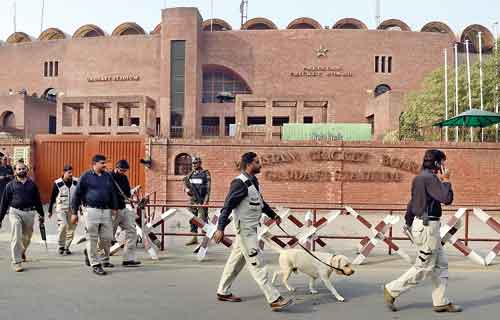Conquering the impossible
 LAHORE, REUTERS, Oct 28 – Even Pakistan’s prime minister did not believe it could happen but when Sri Lanka visit the eastern city of Lahore on Sunday for a T20 match, the hosts will celebrate the end of eight years of isolation from international cricket.
LAHORE, REUTERS, Oct 28 – Even Pakistan’s prime minister did not believe it could happen but when Sri Lanka visit the eastern city of Lahore on Sunday for a T20 match, the hosts will celebrate the end of eight years of isolation from international cricket.
Less than a year ago, none of this appeared possible for a nation that had largely been shunned by international teams since 2009 due to security risks.
That year gunmen attacked a bus carrying the Sri Lanka team from their hotel to Lahore’s Gaddafi stadium for a test match, injuring six players and killing six security personnel and two civilians.
The incident forced Pakistan to play their home matches in the United Arab Emirates and the country has since remained starved of international cricket at home, apart from Zimbabwe’s limited-overs tour in 2015.
Last year, the inaugural Pakistan Super League (PSL), based on the franchise model of the Indian Premier League and Australia’s Big Bash L eague, became a success though all the matches were played in the UAE.
Things changed in March this year when Pakistan hosted the final of its domestic T20 competition featuring high-profile international players.
“Even that baby step seemed an impossibility. I can tell you that none of the franchises wanted it, they were scared … the government was scared…the players were scared,” Pakistan Cricket Board (PCB) chairman Najam Sethi told Reuters in an interview.
The match proved pivotal in changing the global cricket community’s opinion of Pakistan’s ability to host international matches and garnered support from cricket’s governing body, the International Cricket Council (ICC).
The months leading up to the final were filled with endless negotiations with the government, persuading domestic franchise owners and convincing players that security was under control.
“I had two meetings with the prime minister, I raised it with him, he heard me out, he didn’t give me an opinion, he said we will think about it closer to the event,” Sethi said.
As the match drew closer Sethi became desperate, sending then Prime Minister Nawaz Sharif numerous requests “from various quarters” in the hope that he would make a favourable announcement.
Sharif’s office did not respond to requests for comment.
Weeks before the final was to be played Sharif made the announcement that it could go ahead.
“I think he saw the wisdom of it and took the risk,” said Sethi ALMOST WENT UP IN SMOKE In mid-February, less than a month before the final, a suicide attack outside Lahore’s provincial assembly killed 13 and wounded 83.
“There was doom and gloom over here. The franchises came to me and said nothing doing,” Sethi recalled.
A series of late night phone calls and endless meetings with players and franchise owners ensued. The PCB insisted that adequate security measures were in place.
Despite assurances, two days before the match, four international players pulled out, leaving the board 48 hours to find replacements.
“Luckily we had every contingency arrangement in place,” Sethi said.
After the final, Sethi went to work on bringing an international World XI to Pakistan with the support of the ICC.
An international security company hired by cricket’s world governing body gave Pakistan the green light.
Then came the work of assembling a high-profile team for the three-match series.
“I said unless and until you give me top quality players, no way,” Sethi said.
Once the players were finalised, administrators and fans were thrilled to welcome a star-studded World XI team led by South Africa captain Faf du Plessis.
“There was huge tension,” Sethi said, adding that despite all the planning, the PCB was still on edge during the series.
“There were all these calculated risks but in the end it worked out,” he added Next on the list was Sri Lanka, whose players were reluctant to tour Pakistan after the events of 2009.
On a trip to Colombo, Sethi talked about how Pakistan had always toured Sri Lanka even during the civil war, which ended in 2009, when other countries refused to visit.
“I told them we need you now, when you needed us we were there for you,” he said.
With Sri Lanka’s visit confirmed, Sethi is confident that international cricket in Pakistan will soon be fully restored.
West Indies have committed to playing a three-match series but the dates are still undecided.
“I have two other countries lined up who are ready to come,” Sethi said. “By the end of 2020 I think every cricket country would have come and played in Pakistan.”
Squads:
- Pakistan: Sarfraz Ahmed (c & wk), Fakhar Zaman, Ahmed Shehzad, Babar Azam, Shoaib Malik, Mohammad Hafeez, Imad Wasim, Shadab Khan, Mohammad Nawaz, Faheem Ashraf, Hasan Ali, Aamer Yamin, Mohammad Amir, Rumman Raees, Usman Shinwari, Umar Amin.
- Sri Lanka: Thisara Perera (c), Dilshan Munaweera, Danushka Gunathilaka, Sadeera Samarawickrama, Ashan Priyanjan, Mahela Udawatte, Dasun Shanaka, Sachith Pathirana, Vikum Sanjaya, Lahiru Gamage, Seekkuge Prasanna, Vishwa Fernando, Isuru Udana, Jeffrey Vandersay and Chathuranga de Silva, Minod Bhanuka.


